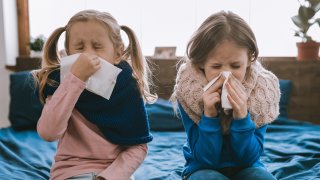

The following content has been provided by Yale New Haven Health. This content does not represent the opinions of the NBC Connecticut news team. Click here to learn more about Yale New Haven Health.
As COVID fatigue sets in and folks start to let down their guard, the stage is set for the flu to spread more substantially than the last few years. Young children in particular are at a higher risk of developing more severe cases of flu and complications can include pneumonia, dehydration, sinus infections and even death. Families can prepare by getting a flu shot, following infection prevention protocols and by keeping kids home when they get sick.
To help to arm parents with the knowledge they need to protect their children and families this year, Thomas Murray, MD, Associate Medical Director of Infection Prevention at Yale New Haven Children’s Hospital, answered some frequently asked questions about flu season.
Get Connecticut local news, weather forecasts and entertainment stories to your inbox. Sign up for NBC Connecticut newsletters.
Is it safe for kids to get the flu shot?
Yes, it’s safe for kids to get the flu shot this year and it’s especially important because there is some evidence flu is already in the community and we are likely to have more flu around than the last couple of years.
Should all kids get the flu shot?
Any child older than 6 months should get the flu shot. The only reason why a child shouldn’t get the shot is if they’ve had a previous allergy to a flu shot.
Common flu symptoms include sudden onset of high fever, cough, congestion, sore throat, headache, muscle aches, fatigue, vomiting and diarrhea. A flu test can confirm if your child has the flu, and your pediatrician can prescribe antiviral medications.
How do flu symptoms differ from COVID-19 symptoms?
Unfortunately, it’s hard to tell the difference between COVID-19 symptoms and flu symptoms. Nearly all the typical flu symptoms can be present with COVID-19. One main difference is if a child experiences the loss of taste or smell. That’s an indicator they may have COVID-19.
If your child is developing symptoms, contact your pediatrician right away. A COVID-19 or test can confirm if your child has either illness, and if they’re positive for either one, they will need to stay home until they are feeling better and for COVID-19 isolation is no longer required.
When should a child go to the Emergency Department?
Take your child to the Emergency Department if they are having difficulty breathing, if their lips turn blue, if they experience chest pain or seizures, if they’re not alert when they’re awake or have a high fever that doesn’t improve with over-the-counter fever reducers.
Dehydration is another common reason to bring a child to the hospital. If your child is vomiting frequently, or they’re not urinating as frequently as they should, they may be dehydrated.
My child already got a flu shot. What else can I do?
Respiratory viruses, including influenza, are making a significant comeback this year. The things we did to prevent these viruses from spreading before COVID-19 remain important. Frequent hand washing and the cleaning of high touch surfaces such as doorknobs and shared toys can keep surfaces from being contaminated. Children should cough into a tissue and dispose of immediately if they are able. Keep your child away from other children with cough, runny nose, and/or fever. If your child is sick, they need to stay home and stay away from other children until your child is feeling better.
To learn more about Yale New Haven Health’s Infection Control and Prevention Program and how they support pediatric patients and parents, click here.

